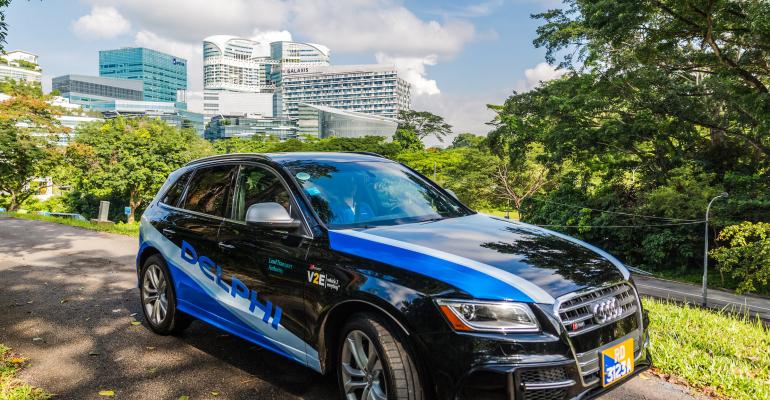TROY, MI – Delphi, which last year conducted an historic trip across the U.S. in a car outfitted with its automated-driving technology, will participate in a large-scale pilot program in Singapore beginning next year to further test the equipment in an intensely metropolitan area.
Over a period of 30 months and in partnership with the island country’s transportation authority, an unidentified OEM and other players such as regional telecommunications companies and downstream suppliers to Delphi, the U.K.-based company will map a section of the city, deploy automated cars with backup drivers and put fully autonomous prototypes into service by 2019.
The overarching goal of the pilot program is to determine if an on-demand autonomous car service could play a role in Singapore’s aggressive push to reduce its notorious traffic congestion and slash growing transportation emissions.
Winning a role in the program is a coup for Delphi as it continues to refashion itself from a onetime captive supplier of General Motors to largely an integrator of advanced electronics, such as the automated technology it and its rivals are racing to sell to OEMs over the next decade.
However, Delphi Vice President Glen DeVos, who as a 25-year veteran of the supplier epitomizes its transformation through his job as head of a newly organized Silicon Valley-based business-services unit, admits financial gains from being the winning selection will be few. At least in the near-term, that is.
“Right now, this is about the technology more than profits,” DeVos says during a briefing of Delphi’s role in the program at its North American headquarters here.
In fact, Delphi probably will not splash the autonomous cars with company logos in sales and marketing play, either. But in the closely knit automotive industry and on the heels of Delphi’s cross-country run, it likely will draw attention to the automated-technology package it is building.
“This puts it on the ground,” says DeVos, whose group forecasts fully autonomous cars in the 2020 timeframe.
For Singapore, the program will test its “first-mile, last-mile” proposition, a scheme where automated cars would take commuters to stops along its renowned mass transit routes instead of driving themselves. The cars also could cover the final leg of their destination, rather than use the city’s ubiquitous taxis as many do today.
In addition to reducing congestion and slashing emissions from internal-combustion cars, autonomous cars would be safer around Singapore’s heavy pedestrian and bicycle traffic, the local government thinks.
There’s an economic motivation, too, DeVos says, citing cost-of-ownership studies showing it is cheaper to live without a car in metropolitan areas.
Delphi expects to deploy six vehicles with its automated technology in Singapore’s One North district, a mixed-use neighborhood. Initial mapping of the area to within fractions of an inch has begun. In the next phase, Delphi will deploy cars with a driver at the wheel for safety precautions and riders will be specially selected. The final phase in 2019 sees driverless units working three routes in the district, with the longest an estimated 3.5 miles (5.6 km).
“By 2019, we will have demonstrated fully autonomous capability,” DeVos says.
Looking past 2019, DeVos says an opportunity may exist to put into use a purpose-built, fully autonomous vehicle without equipment such as a steering wheel and pedals. Models used in the program beginning next year will be modified versions of a traditional car.
DeVos says Delphi continues to shop for an OEM partner in the program. Delphi’s vehicle of choice for its fleet of autonomous vehicles under testing in Mountain View, CA, is the luxurious Audi SQ5 large CUV.
“That’s a really nice car,” he says with a smile, but concedes a less flashy but radically more efficient, preferably battery-electric vehicle seating 4-6 would be the best fit for the Singapore program. A telecom partner also must be determined, DeVos adds.
A key element of the program not to be overlooked is getting everyday people accustomed to automated technology.
“That is one area that needs a lot of development,” DeVos says. “People need to feel good about using it, (and) not just the techies but regular people.”
The program also helps automated-technology players such as Delphi look down the road to a day when the cars are used not just for commuting but perhaps to autonomously perform tedious, everyday tasks like picking up groceries or laundry. Imagine if one of the cars could do that for a driver through a smartphone app, DeVos offers. He says interest already is high among commercial-fleet operators.
“There is a direct economic benefit to removing the driver from the vehicle,” he says.
Delphi’s vision does not seek to eliminate vehicle ownership. “It will complement it,” DeVos says.





